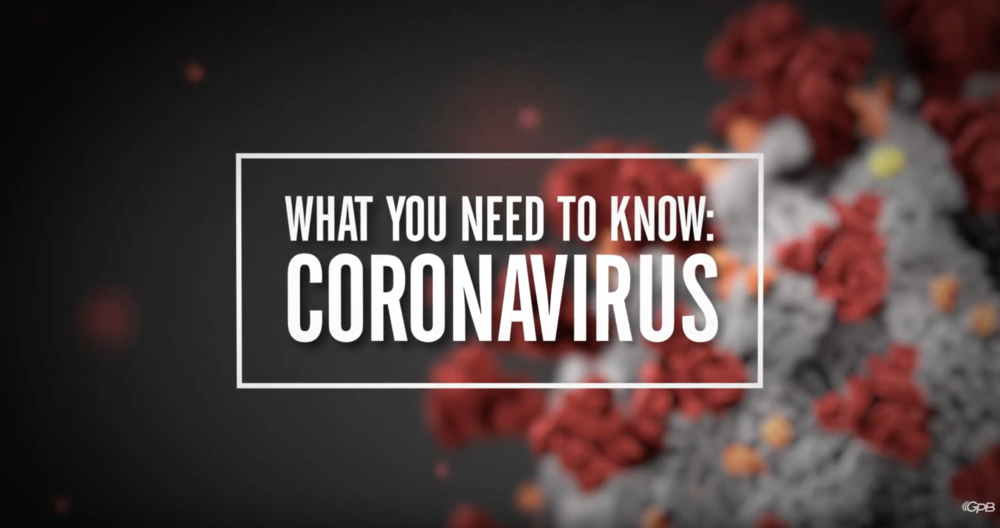Section Branding
Header Content
What You Need To Know: Coronavirus With Virginia Prescott Featuring Dr. Colleen Kraft
Primary Content
Across Georgia and the nation, schools and businesses are closed, major events have been canceled and millions of people have been ordered to work from home to help mitigate the spread of the novel coronavirus — or COVID-19. Life as we know it has been disrupted. People are scared and looking for solid information.
Georgia Public Broadcasting’s new series “What You Need To Know: Coronavirus” provides fact-based information on getting through the virus with health and sanity intact.
As of Mar. 17, there are 4161 confirmed cases of COVID-19 in the U.S., with 121 in Georgia. Worldwide, however, more than 80,000 people have recovered. To give the latest information, Dr. Colleen Kraft spoke with GPB's Virginia Prescott. Dr. Kraft is associate professor in the Division of Infectious Diseases at Emory's Clinical Virology Research Laboratory and associate chief medical officer at Emory University Hospital. She's also on Gov. Brian Kemp's Coronavirus Task Force.
Social distancing v. isolation v. quarantine
So isolation is when you are put into a place where you are separated from others. And so you are sick, you have the disease and you are to be isolating yourself from others. Social distancing is when we're in public or when you're around other people, just keeping your distance. I think, actually as Americans, we're pretty good at this if you think about other countries and other practices. And then, quarantine is really when people who are not unwell are kept away from others. If you're not sick, it's called quarantine. And if you are in public, it's social distancing.
How healthcare professionals are staying safe
We have been spending two months really talking about protocols. Things have changed as we've gotten more patients that are suspected [to be sick.] So we continue to really hammer out the things that we always should be doing during respiratory season, which is wearing the appropriate personal protective equipment when we see a patient that is coughing or has a fever, cleaning surfaces and limiting people that are in and out and [with]in the healthcare system that may also be carriers of the virus. And so in a sense, I feel like a side effect of this outbreak is real big attention to these protocols we should be doing anyways. But we get a little bit lax because we don't always see the ramifications of our actions.
Will healthcare professionals test positive once testing is more accessible?
We were really surprised that we did not have that many positives at all among patients or health care workers initially. I think it's really hard to predict where we're going to be at the end of the week, for instance. So we think that it's increasing, but we're also not sure if we're better at picking the people that need to be tested. I think once we have very wide scale testing that we'll really understand the spectrum of this disease. But I think at this point, it's a little bit early. We are still seeing people that are very sick from this disease. So it's not something to take lightly. But most of the people we are seeing are very mildly ill, if ill at all.
Politico reports that all 121 of Georgia’s tests given came back positive. What does this indicate?
I need to still drill down on that Politico article. I'm not really sure where those numbers are coming from. I can tell you that as the individual that's coordinating our testing here at Emory Healthcare, that our numbers are definitely a much lower number of positivity. And so I don't know if it's just our reporting. You know, there's always these issues with statistical reporting. [...] Did they report all of our individuals that were tested, or just those that were tested positive?
How to maintain hygiene during the coronavirus outbreak
I think, again, a side effect of this outbreak is going to be that we are doing the types of hygiene that we should be doing right during respiratory season. We really should be wiping down our surfaces at home. If somebody's sick, make sure that that person is isolated in the home, washing everything after that person's been ill that they've been touching. When we're in public, I think wiping down the grocery cart is something that has started to appear more widely. People are focused a lot more on the surfaces that they're touching. But if you don't have a way to wipe down something that you think may be dirty or other people have touched, also, just don't touch your face until you wash your hands. So just having an awareness of our surroundings, what's dirty and clean, what we have control of. Then cleaning them after we touch them and cleaning our hands after we touch them is really important.
Flattening the curve by staying apart
I think one of the things that I've been asked a lot is, “Are we overreacting as a society?” And one of the things that reassures me is those curves that the CDC has been showing that are very flattened when you have some sort of social intervention, such as school closing, teleworking, all of those items. So it allows individuals to not be together. And then what ends up happening is, we hope to sort of eliminate it from our population sooner because we really haven't cohorted everybody together in our typical behaviors.


